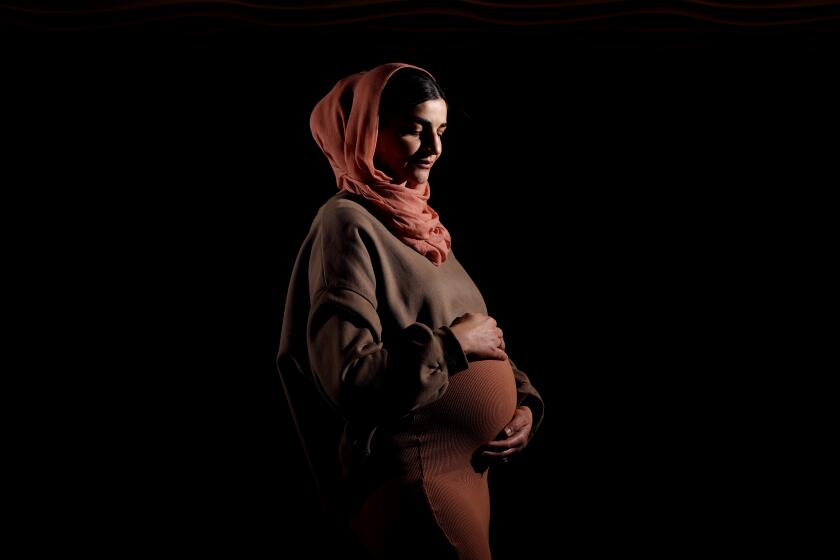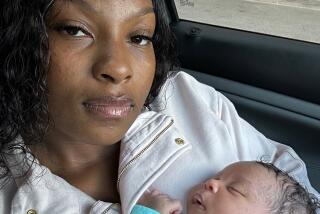She wanted to raise money for mothers of color. So she livestreamed her son’s birth
- Share via
As Marz Lovejoy went into labor with her second child on Tuesday evening, a group of supporters beyond her close-knit family was present for the typically private occasion thanks to a livestream on the internet.
More than 1,500 people watched as the New York-based musician, philanthropist and model gave birth to a baby boy, Mars Rasmussen-Lovejoy, at her mother’s Minnesota home. With the help of a midwife trained to handle the delivery of babies, Lovejoy, who became well-known after posing pregnant in a Fenty X Savage campaign, powered through the quick delivery, which streamed online for 15 minutes. She was in labor for about an hour.
Lovejoy, 29, intended for the livestream to have serious production values, with special lights and cameras to show all angles of the delivery, but the baby came too quickly.
Instead of having her son in a room that was adorned with her favorite plants, flowers and a large birthing tub, she ended up having Mars in a bathtub she was already sitting in when the contractions started. Her best friend, Melia Thompson-Dudiak, used a laptop to stream the birth in the tight-space room.
Lovejoy cheered herself on as she pushed, often saying, “Yes. Let’s go.” (The comments in the chat were disabled.) After her son was born, she threw up a peace sign to the camera and the livestream ended.
The primary purpose of the livestream was to raise money for minority mothers to pay for a doula — a trained companion who provides support for women throughout their pregnancy — and midwives.
Carson Meyer, daughter of an NBCUniversal executive and sister of jewelry designer Jennifer Meyer, is reaching parents-to-be virtually in the COVID-19 age.
Few insurance companies cover home birth costs, which can range from $2,000 to $5,000 or more depending on the area. Lovejoy said a portion of the donations also will be used to support training for birth workers.
Viewers were asked to pay $3 minimum to watch the livestream through the Crowd Cast streaming platform. Lovejoy’s effort raised about $33,000, most of which was donated prior to Tuesday’s main event for the campaign she dubbed #MarzsLiveBirthStream. She is still accepting donations.
Lovejoy is working with the Roots Community Birth Center in Minneapolis and Mama Glow in New York to assist with allocating donations.
Celebrities including Kehlani, Karrueche Tran, SZA and Erykah Badu, who agreed to be Lovejoy’s virtual doula, rallied in support of the cause.
At a time when hospitals are at high alert and more restrictions have been put in place because of the pandemic, Lovejoy said that pregnant women, especially those of color, inspired her to share her home birth.
“[I’ve been] thinking about all my sisters who are pregnant and are not in a position to have a home birth or have a birthing center and have to be in a hospital,” she told The Times by phone late last month. “And this may be their first time being pregnant, on top of being a woman of color, when you already feel like you’re not heard. Now everything is on level 100. … I wanted to share my story just to spread awareness and show what home birth looks like.”
Under coronavirus threat, hospitals across L.A. County have tightened visitor policies in maternity wards.
About 1% of mothers have home births each year in the United States. Lovejoy said because of the lack of information available, women aren’t always aware of the various options for childbirth. Although she chose to have home births, which is not feasible for all mothers depending on their health and pre-existing conditions, Lovejoy urges women to deliver where they feel most safe.
When Lovejoy told her family that she wanted to livestream her home birth, none of her loved ones were surprised.
She documented several moments of her pregnancy with her daughter, Nomi, through the song and video called “B-A-B-Y,” which was later turned into a children’s book. She and her husband, Simon Rasmussen, the editor-in-chief of Office magazine — where Lovejoy is the culture editor — also posted a series of eccentric photos related to her pregnancy on Instagram.

“It was like how I was documenting my life before I got pregnant. It was just now this time I was pregnant,” said Lovejoy, who lives in Harlem, N.Y. “And once I started doing that, my community came to me, and it really opened my eyes.”
She’s built a community on social media where she has more than 60,000 followers on Instagram.
“It’s just in her character,” Lovejoy’s mother, Susanne Lovejoy, told The Times earlier this month. “She uses her influence. She uses social platforms and she creates these bigger awareness campaigns. [The live home birth] is right up her alley.”
Alarming studies about black maternal deaths made Lovejoy realize that her cause could educate others.
According to the Centers for Disease Control and Prevention, black women are three to four times more likely than white women to die during labor. A national study, published in the American Journal of Public Health in 2007, further showed that of five medical complications that are common causes of maternal death and injury, black women were two to three times more likely to die than white women who had the same condition.
About 60% of pregnancy-related deaths are preventable. Superstars including Serena Williams and Beyoncé have spoken out about their life-threatening experiences with their pregnancies.
Last month, a 26-year-old woman of color named Amber Isaac died shortly after giving birth to her first child through an emergency Caesarean in New York. Lovejoy took to social media to share her thoughts on the issue, saying, “This activism and heart-work must continue. It is truly life or death.” Lovejoy plans to donate a portion of the money she raised to Isaac’s family as well.
The harsh realities such as Isaac’s and those of other mothers of color are the reason why Nadine Ashby, who was Lovejoy’s doula, got involved in the field.
Advocacy “is at the heart of my doula business,” Ashby said. “It is so important because those statistics are the result of implicit bias and people can say, ‘Oh, well — what about diet and what about socioeconomic status,’ but there are studies that show even a black woman who has all of the resources, the money [and] the education has the same outcome as the one who doesn’t have all of those things. And so the common denominator here is bias. It’s racism.”
Lovejoy said having an advocate such as a doula during pregnancy can increase a mother’s odds of having a successful birth.
“I can’t stress enough how important it is to either know how to advocate for yourself, especially in a time during pregnancy, but really any situation, medical, legal, [and] just being aware of that and having that agency over your body,” Lovejoy said. “And if you can’t do it, then knowing how to find somebody who can.” After all, that’s what birth workers are for.
Lovejoy said she will continue to raise awareness about maternal mortality and home births through her socially conscious business. In the meantime, Lovejoy and her loved ones will enjoy the latest addition to their family, Mars, while also trying to navigate the global COVID-19 crisis.
“This is only the beginning,” Lovejoy said in an Instagram post. “There’s work that needs to be done.”
More to Read
Sign up for The Wild
We’ll help you find the best places to hike, bike and run, as well as the perfect silent spots for meditation and yoga.
You may occasionally receive promotional content from the Los Angeles Times.













